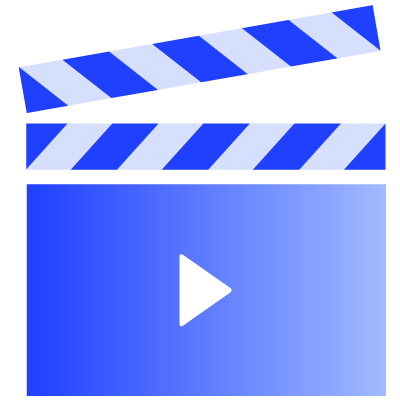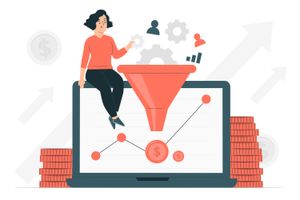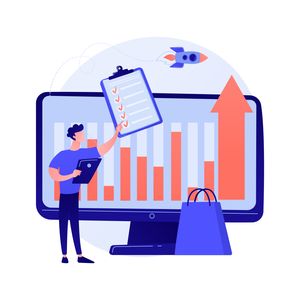Lead
A potential customer who has shown interest in a company's product or service through a specific action, like filling out a form or making a call.
Prospect
A person or organization that may become a customer for a company's product or service.
Qualification
The process of determining if a lead is a good fit for a company's product or service and is worth pursuing as a potential customer for a product or service.
Closing
The final stage of a sales process in which a customer agrees to make a purchase.
Conversion
The act of turning a lead or prospect into a paying customer.
Upsell
A sales technique in which a seller tries to sell a more expensive or upgraded version of a product or service to an existing customer.
Cross-sell
A sales technique in which a seller tries to sell complementary or additional products or services to an existing customer.
Follow-up
The process of staying in contact with a lead or customer after an initial interaction or sale, to maintain the relationship and potentially generate repeat business.
Objection
A concern or objection raised by a customer during a sales process that needs to be addressed or overcome before a sale can be made.
Commission
A payment or compensation for sales made, typically a percentage of the sale price.
Target
A specific, measurable goal or objective set by a company or salesperson for a specific time period.
Forecast
A prediction or estimate of future sales or revenue, typically based on historical data and current trends.
Pipeline
A visual representation of the sales process, showing the progress and status of leads and deals at each stage.
Funnel
A visual representation of the customer journey, showing the number of leads that progress through each stage of the sales process towards conversion.
KPI
Key Performance Indicator, a measure of the success or progress of a specific aspect of a company's operations, such as sales, marketing, or customer satisfaction.
ROI
Return on Investment, a measure of the profit or gain from an investment, calculated as a ratio of the net gain to the cost of the investment.
Close rate
The percentage of leads or deals that successfully reach the closing stage of the sales process and result in a sale.
Average order value
The average amount of money spent per order or transaction.
Lifetime value
The total value of a customer to a company over the entire duration of their relationship, including all purchases and potential upsells.
Customer acquisition cost
The cost of acquiring a new customer, including all marketing and sales expenses, can be significantly reduced through the implementation of a b2b referral program, where satisfied clients recommend the company’s product or service to their business associates.
Outbound sales
A proactive sales approach where a salesperson reaches out to potential customers through techniques such as cold calling, emailing, or door-to-door sales.
Inbound sales
A reactive sales approach where a company attracts potential customers through marketing and branding efforts, and then converts them into paying customers through follow-up and relationship-building.
Cold calling
A sales technique in which a salesperson contacts potential customers without prior contact or relationship, typically through a phone call.
Warm calling
A sales technique in which a salesperson contacts potential customers who have previously shown interest or interacted with the company, typically through a phone call.
Mass emailing
A sales technique in which a company sends a bulk email to a large number of potential customers, with a standardized message or offer
Personalized emailing
A sales technique in which a company sends a customized email to each potential customer, with a tailored message and offer based on specific information and interests.
Sales deck
A visual presentation used by a salesperson to communicate the value of a product or service and persuade a potential customer to make a purchase.
Sales pitch
A structured, persuasive message delivered by a salesperson to communicate the benefits and value of a product or service and convince a potential customer to make a purchase.
Sales script
A pre-written script used by a salesperson as a guide for their sales pitch, to ensure consistency and effectiveness in their sales message.
Sales enablement
The use of tools, technology, and training to support and improve the effectiveness of the sales process.
Sales automation
The use of technology to automate repetitive or manual tasks in the sales process, such as lead generation, follow-up, and reporting.
Sales dashboard
A visual display of key sales metrics and data, providing real-time insights into the performance and progress of the sales team.
Sales territory
A specific geographic area or market is assigned to a salesperson, within which they are responsible for generating sales and building relationships.
Sales quota
A specific, measurable goal for the amount of sales or revenue a salesperson or team is expected to achieve in a given time period.
Sales goal
A specific, measurable objective set by a salesperson or team, to achieve a desired outcome, such as increased sales or customer satisfaction.
Sales incentive
reward or recognition program is provided to a salesperson or team to motivate and encourage performance, such as a bonus or commission.
Sales training
A program or course designed to develop and improve the skills and knowledge of a salesperson or team.
Sales coach
A mentor or trainer who provides guidance, support, and feedback to a salesperson or sales team, helping them to improve their sales performance and reach their sales goals.
Sales manager
A leader or supervisor responsible for overseeing and directing the sales team, setting sales goals and strategies, and achieving sales targets.
Sales team
A group of individuals who are responsible for generating sales, building relationships with customers, and achieving sales targets.
CRM
A system or software used to manage customer interactions and data throughout the customer lifecycle, from lead generation to post-sales support.
Lead generation
The process of identifying and attracting potential customers, through techniques such as marketing, advertising, or sales outreach.
Lead nurturing
The process of building and maintaining relationships with potential customers, through ongoing communication and content, to keep them engaged and interested in a company's product or service.
Lead scoring
The process of assigning a score to potential customers based on their engagement, interest, and fit with a company's product or service, to priorities and focus sales efforts.
Sales intelligence
The use of data and insights to inform and improve the sales process, by understanding customer needs and behaviors, market trends, and competitive landscape.
Sales analytics
The use of data and metrics to measure and analyze the performance and effectiveness of the sales process, and identify opportunities for improvement.
Sales optimization
The use of data, technology, and best practices to continuously improve and streamline the sales process, to increase efficiency, productivity, and results.
Sales process
A structured, repeatable series of steps and activities used by a salesperson or team to identify, qualify, close, and manage customer sales.
Sales cycle
The complete journey of a customer from initial interest to final purchase, including the various steps and activities of the sales process.
Sales funnel analysis
The use of data and metrics to analyze and understand the performance of the sales funnel, and identify areas for improvement and optimization.
Sales performance management
The use of metrics, feedback, and coaching to monitor, evaluate, and improve the performance of the sales team.
Sales tactics
Specific, short-term actions or techniques used by a salesperson or team to achieve specific sales goals, such as lead generation, closing, or upselling.
Sales strategy
A long-term plan and approach used by a salesperson or team to achieve overall sales objectives, such as increased market share or customer satisfaction.
Sales enablement technology
Tools and platforms used to support and improve the sales process, such as customer relationship management (CRM) systems, sales intelligence software, and sales automation tools.
Sales enablement tools
Specific software, apps, or platforms used to support and improve the sales process, such as email tracking, proposal generation , or customer insights.
Sales productivity
The efficiency and effectiveness of the sales process, as measured by sales results, time management, and resource utilization.
Video conferencing
A technology that allows individuals to communicate and collaborate remotely, using audio and video over the internet.
Video presentation
A visual demonstration of a product or service, using video to communicate the value proposition and benefits.
Video demo
A live or recorded video demonstration of a product or service, using video to show how it works and what it can do.
Video sales letter
A persuasive video message that communicates the benefits and value of a product or service, and motivates a potential customer to make a purchase.
Video sales pitch
Video pitch is a structured, persuasive video message delivered by a salesperson to communicate the benefits and value of a product or service and convince a potential customer to make a purchase.
Sales email
A sales email is an email message that is sent by a salesperson or a business to a prospective customer or client with the aim of selling a product, service or solution. The purpose of a sales email is to attract the recipient's attention and persuade them to take action, such as making a purchase, scheduling a meeting, or setting up a demo.
What is sales management software
Sales management software is a type of software that is designed to help sales teams manage their sales process, leads, and customer relationships more effectively. It is a tool that can assist with everything from lead generation and prospecting to closing deals and post-sales support.
Sales videos
Sales videos are marketing tools used to promote and sell a product or service. They are typically short videos that showcase the benefits of the product or service and aim to persuade the viewer to make a purchase.


 Free Screen Recorder for Chrome
Free Screen Recorder for Chrome













